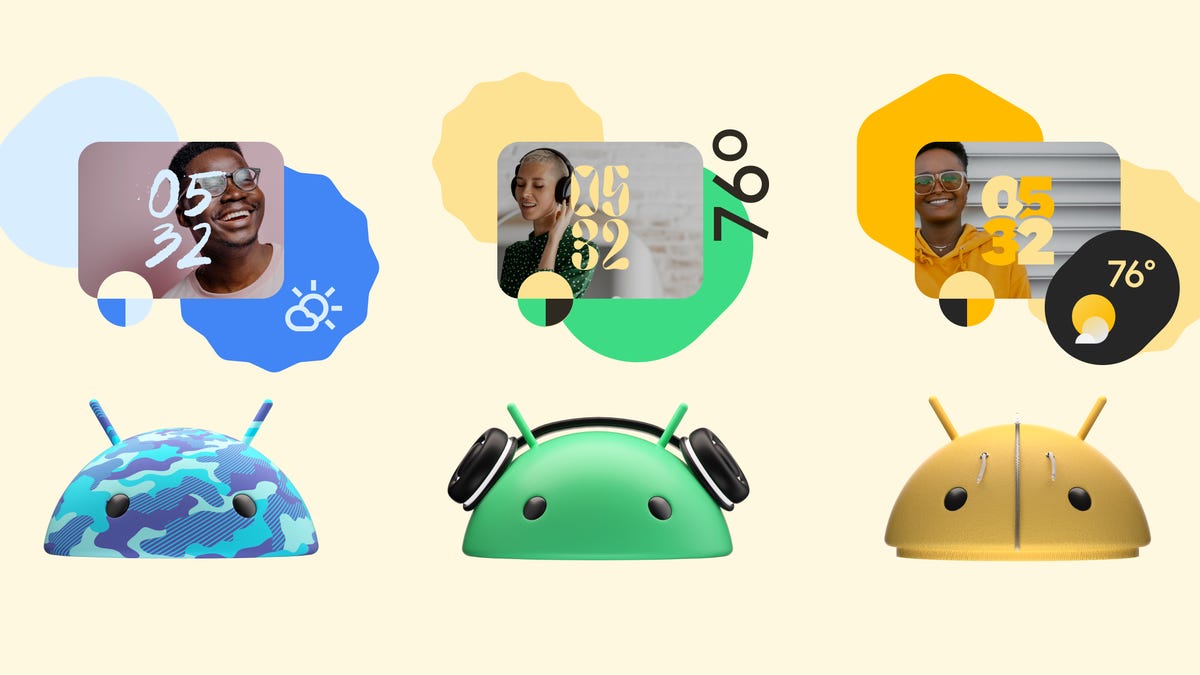Google Will Use AI to Rewrite Your Texts and Generate Android Wallpapers
At Google I/O, the company is showing how generative AI will arrive on our phones.

Google announced new customize features for Android at Google I/O
Artificial intelligence is about to play a bigger role in how you use your phone. Google announced new features that will use AI to rewrite text messages and generate new Android wallpapers, further signaling its ambitions to establish itself as a leader in generative AI, or AI that can create content based on text prompts.
Google made the announcement on Wednesday during its annual I/O developer conference, where it typically unveils new products, developer tools and experimental technologies. Generative AI has been the 2023 tech industry buzzword, following the success of OpenAI's ChatGPT chatbot in late 2022.
Now Google is providing a glimpse at how the technology will surface in Android and its apps. And so far, it looks like Google's approach is all about using generative AI to bring more customization and personalization options to mobile devices.
"One of the things we learned along the way was that if you make the system so customizable, then you have all these settings levers, and it gets quite complicated," said Dave Burke, vice president of engineering for Android. "And so then we realized, well actually there are ways to do this that are smart."
More from Google I/O
Magic Compose, which launches in Google's messaging app in beta this summer, is one such example. It's a tool that essentially lets you change the tone of a text message before hitting the send button. You could, for example, make your message sound more chill or excited or have it written in the style of Shakespeare. It looks similar to the feature that 9to5Google leaked just before Google I/O. Changes can be applied by tapping a magic wand icon in the app. Google also says Magic Compose will suggest responses based on the context of a message.
Messages that have been customized using Magic Compose won't be labeled as such because the "human is in the loop," according to Burke. Google isn't writing the message from scratch; it's modifying your text, which you can edit before sending.
"We make a suggestion, and you can edit it," he said.
A screenshot showing what Google's Magic Compose feature will look like.
Google is also using generative AI to come up with new Android wallpapers that are produced on-demand. There will be categories and prompts to choose from, which not only gives users a starting point but also should prevent the system from creating a wallpaper that may be inappropriate. For example, you'll be able to pick a prompt like "city by the bay in a Post-Impressionist style" to generate a new background that fits that description.
Burke also says Google used public domain training data, which should ensure that the system doesn't create imagery that's copyrighted. The generative AI wallpapers will be available this fall, but Google is launching other new wallpaper options for Pixel devices next month. Those include new emoji-based wallpapers and cinematic wallpapers that stylize your photos in a portrait mode-like aesthetic.
A look at Google's new generative AI wallpaper.
Burke sees a lot of opportunity for generative AI to further change the way we use our phones, from the types of wallpapers we set to how we compose messages. He imagines a future in which AI can be used to generate a new background on an existing photo that changes throughout the day or even the season.
"There [are] just a ton of really interesting use cases in that kind of input expression area," he said.
The new features are Google's approach to what's becoming a very competitive space. Meta, for example, plans to incorporate more AI into apps like WhatsApp and Messenger. And just before Google I/O, Microsoft opened up access to its Bing AI search engine and chatbot. Google and Microsoft have also been competing for dominance in the category throughout the year, particularly when it comes to online chatbots and productivity tools.
The announcement also comes as the limitations of generative AI-based applications have become clear. Google's Bard chatbot, for example, shared inaccurate information in a demo earlier this year. A study from the Center for Countering Digital Hate published in April found that Bard generated misinformation and false claims. There have also been instances in which seemingly innocuous technologies -- like the ability for Google Photos to surface memories from previous years -- have resulted in unintended consequences, such as resurfacing sensitive or painful memories.
When asked about Google's approach to ensuring that new technologies are applied in ways that are safe and account for such limitations and consequences, Burke pointed to Google's AI principles.
"If you look at our AI principles, they try to enshrine things like being socially responsible about unfair bias, testing for safety," he said. "You actually have to go out of your way to test this stuff. The technologies need to be accountable to humans."
For more from Google I/O, take a look at the Pixel Fold, Pixel 7A, Pixel Tablet and Android 14.
Editors' note: CNET is using an AI engine to create some personal finance explainers that are edited and fact-checked by our editors. For more, see this post.

